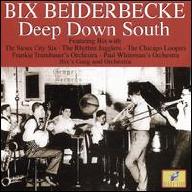Beiderbecke was a bit of a child prodigy, picking out tunes on the piano when he was three. While he had conventional training on the piano, he taught himself the cornet. Influenced by the original Dixieland Jazz Band, Beiderbecke craved the freedom of jazz but his straitlaced parents felt he was being frivolous. He was sent to Lake Forest Military Academy in 1921 but, by coincidence, it was located fairly close to Chicago, the center of jazz at the time. Beiderbecke was eventually expelled because he missed so many classes. After a brief period at home he became a full-time musician. In 1923, Beiderbecke became the star cornetist of the Wolverines and a year later this spirited group made some classic recordings.
In late 1924, Beiderbecke left the Wolverines to join Jean Goldkette's orchestra but his inability to read music resulted in him losing the job. In 1925, he spent time in Chicago and worked on his reading abilities. The following year he spent time with Frankie Trumbauer's orchestra in St. Louis. Although already an alcoholic, 1927 would be Beiderbecke's greatest year. He worked with Jean Goldkette's orchestra, recorded his piano masterpiece "In a Mist" (one of his four Debussy-inspired originals), cut many classic sides with a small group headed by Trumbauer (including his greatest solos "Singin' the Blues," "I'm Comin' Virginia," and "Way Down Yonder in New Orleans"), and then signed up with Paul Whiteman's huge and prosperous orchestra. Although revisionist historians would later claim that Whiteman's wide mixture of repertoire (much of it outside of jazz) drove Beiderbecke to drink, he actually enjoyed the prestige of playing with the most popular band of the decade. Beiderbecke's favorite personal solo was his written-out part on George Gershwin's "Concerto in F."
With Whiteman, Beiderbecke's solos tended to be short moments of magic, sometimes in odd settings; his brilliant chorus on "Sweet Sue" is a perfect example. He was productive throughout 1928, but by the following year his drinking began to catch up with him. Beiderbecke had a breakdown, made a comeback, and then in September 1929 was reluctantly sent back to Davenport to recover. Unfortunately, Beiderbecke made a few sad records in 1930 before his death at age 28. The bad liquor of the Prohibition era did him in.
For the full story, Bix: Man & Legend is a remarkably detailed book. Beiderbecke's recordings (even the obscure ones) are continually in print, for his followers believe that every note he played was special. ~ Scott Yanow, Rovi















